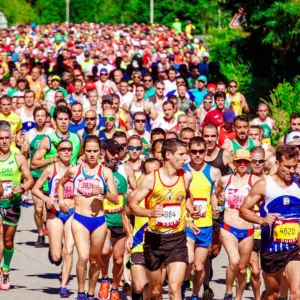
Dr. Joshua Scott asks on benefits and risks of foregoing breakfast before a run, it depends.
Article Link: Running on an Empty Stomach: How Fuel Impacts Your Performance
If you’ve ever had a big breakfast right before a run, you’ve probably learned the hard way why it’s not always the best idea. Food plus hard exercise usually equals queasiness and cramping at best…and full-on puking at worst.
“Digesting food and exercising at the same time is difficult for most athletes,” says Joshua Scott, M.D., a primary care sports medicine physician at Cedars-Sinai Kerlan-Jobe Institute in Los Angeles. But running on an empty stomach can be tough, too. (Talk about seriously bonking.)
Let’s quickly recap the benefits of eating something before a morning run. Assuming you haven’t noshed since the night before, your body’s levels of glucose—the fuel your muscles use for energy—are pretty low. You’ll likely have enough to make it through a short run that’s less than an hour at an easy to moderate effort. But if you’re planning on running for more than 60 minutes or doing intense intervals on a totally empty stomach, you might find yourself feeling slow, lethargic, or even lightheaded without eating, Scott explains.
Eating before harder efforts brings those glucose levels back up, so your muscles have plenty of fuel to put to work quickly. The problem? Having a ton of food jostling around in your stomach can be a recipe for nausea, side stitches, or vomiting. And even if you don’t feel queasy, there’s a good chance your run will seem harder. During digestion, blood gets diverted toward your GI tract and away from working muscles (in this case, your legs). “That can make an otherwise usual workout seem more difficult,” Scott says.
Pounding the pavement without eating anything might help you steer clear of stomach issues. “Having an empty stomach prevents food from being bounced around,” Scott says, so you’re less likely to get slammed with the urge to upchuck. Time is also a factor. Not having to spend time prepping food and eating before your run might mean you get to sleep a little later—always a nice bonus!
Read full article here.






